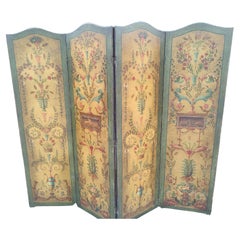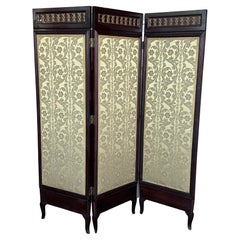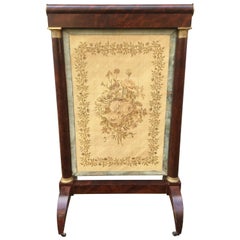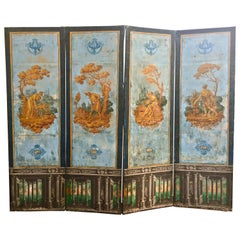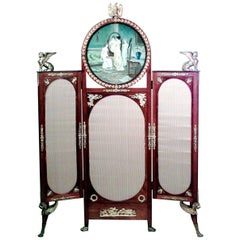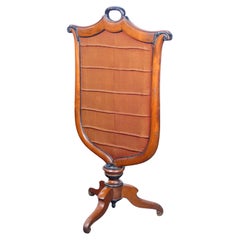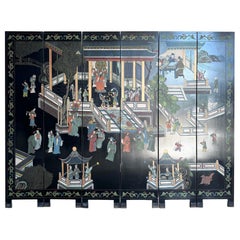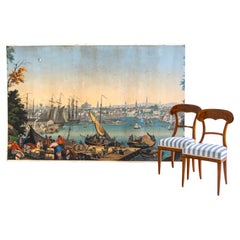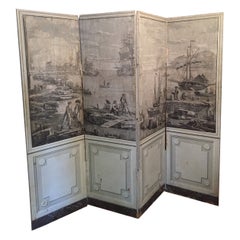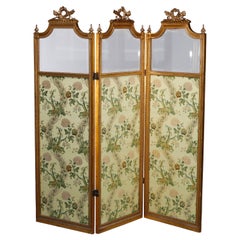Empire Screens and Room Dividers
From 1804–15, Napoléon I reigned as the emperor of France, bringing the country into a new era of opulence after the fall of the monarchy and the tumultuous years of the French Revolution. He declared, “We must have very solid things, made to last 100 years.” Empire-style furniture followed suit, with imposing pieces constructed from mahogany and adorned with gilded ornaments. Expanding on the neoclassicism popularized in the previous century — such as in Louis XVI style — Empire style borrowed from the great civilizations of antiquity, from Egypt to Greece and Rome, to connect this nascent empire to the power of the past.
Napoléon I believed the production of fine furniture would reflect the stature of the republic, with his official architects Charles Percier and Pierre-François-Léonard Fontaine leading the way with their work on his residences.
Luxurious materials, symmetrical shapes and bold colors characterize antique Empire-style bedroom furniture, armchairs, cabinets and other structures, with frequent motifs including mythological creatures, geometric designs, acanthus leaves, eagles, bees (the imperial emblem) and swans, a favorite of Empress Joséphine.
Flat surfaces, like marble tabletops, were accented with decadent details, such as the bronze furniture mounts made by sculptor Pierre-Philippe Thomire for the French palaces. Martin-Guillaume Biennais, who worked as the imperial goldsmith, crafted intricate luxury objects that mixed wood, fine metal, mother-of-pearl and ivory. Ormolu — or elaborate bronze gilding — was essential to French design in the 18th and 19th centuries as a cornerstone of the neoclassical and Empire styles.
The style became popular abroad, influencing the American Empire style. Stately pieces carved with sprigs of olives by cabinetmaker Pierre-Antoine Bellange were acquired by American President James Monroe for the White House in 1817.
Find a collection of antique Empire tables, lighting, seating and other furniture on 1stDibs.
1870s French Antique Empire Screens and Room Dividers
Brass
Late 19th Century French Antique Empire Screens and Room Dividers
Bronze
Early 19th Century French Antique Empire Screens and Room Dividers
Bronze
Late 18th Century French Antique Empire Screens and Room Dividers
Paper
19th Century French Antique Empire Screens and Room Dividers
Bronze
Early 19th Century Antique Empire Screens and Room Dividers
Canvas, Wood
1820s French Antique Empire Screens and Room Dividers
Brass, Steel
1980s Chinese Vintage Empire Screens and Room Dividers
Wood
Mid-20th Century French Empire Screens and Room Dividers
Plywood, Paper
Early 19th Century English Antique Empire Screens and Room Dividers
Wood
Early 20th Century French Empire Screens and Room Dividers
Wood, Paper
21st Century and Contemporary American Empire Screens and Room Dividers
Paper
1790s Italian Antique Empire Screens and Room Dividers
Wood
1950s French Vintage Empire Screens and Room Dividers
Cane, Wood
Early 19th Century English Antique Empire Screens and Room Dividers
Mahogany
Mid-20th Century Italian Empire Screens and Room Dividers
Wood
Late 19th Century French Antique Empire Screens and Room Dividers
Bronze, Wire, Ormolu
1980s Vintage Empire Screens and Room Dividers
Wood
Mid-20th Century Unknown Empire Screens and Room Dividers
Walnut
Early 19th Century French Antique Empire Screens and Room Dividers
Brass
19th Century French Antique Empire Screens and Room Dividers
Fabric, Glass, Wood, Giltwood
Early 19th Century French Antique Empire Screens and Room Dividers
Bronze
